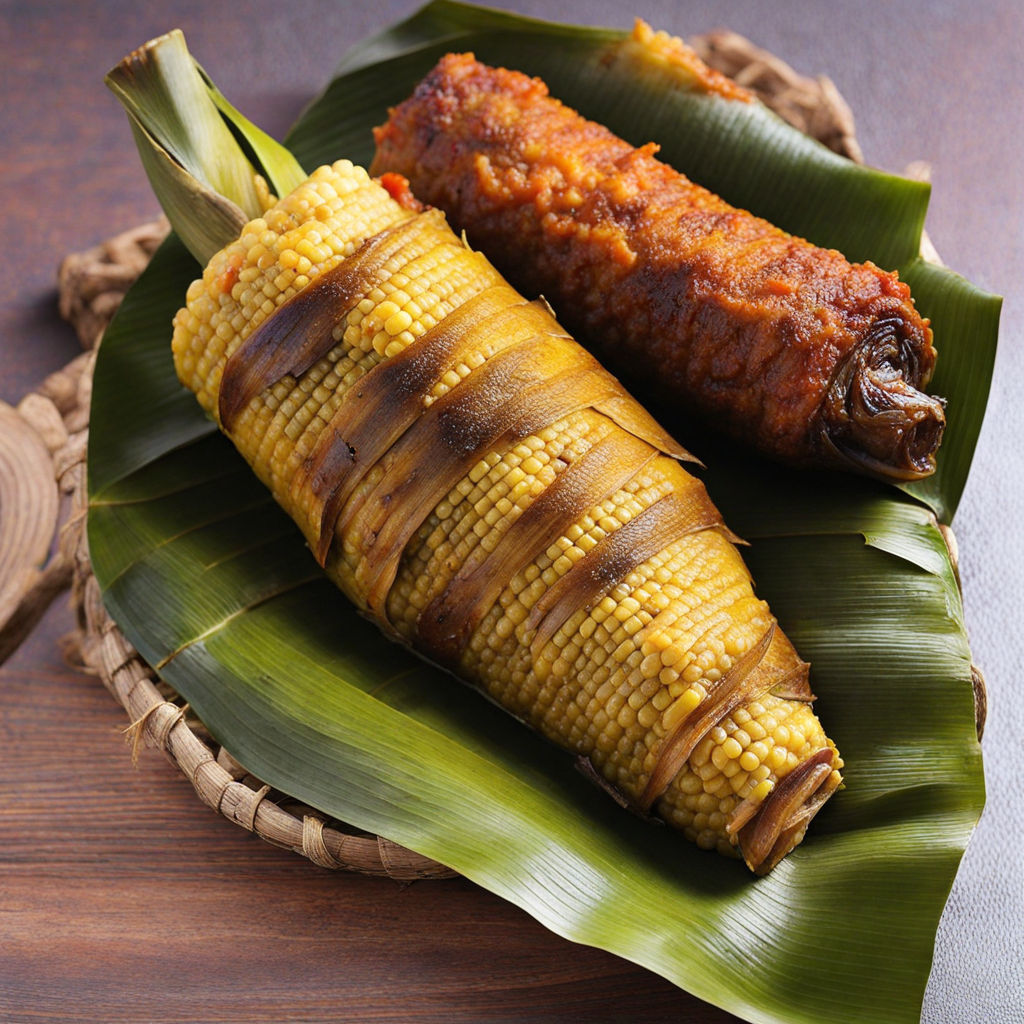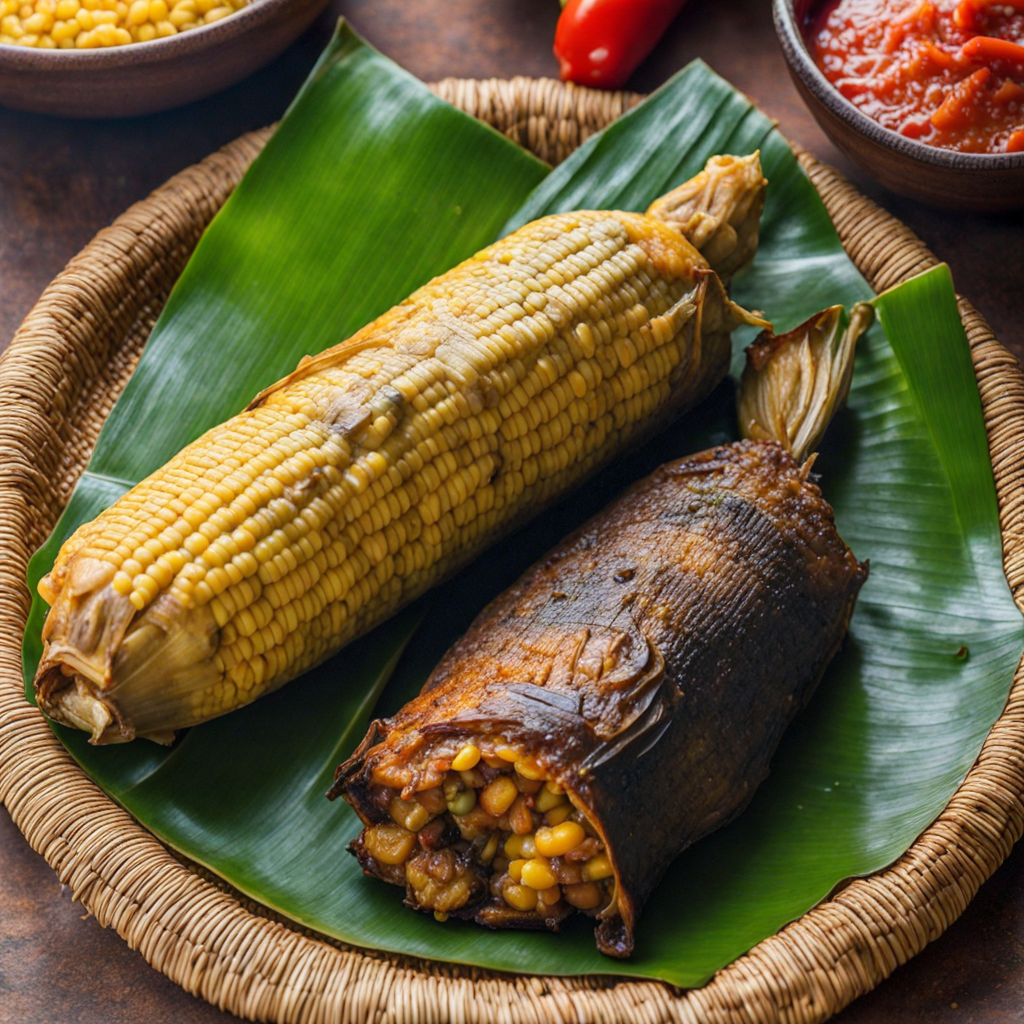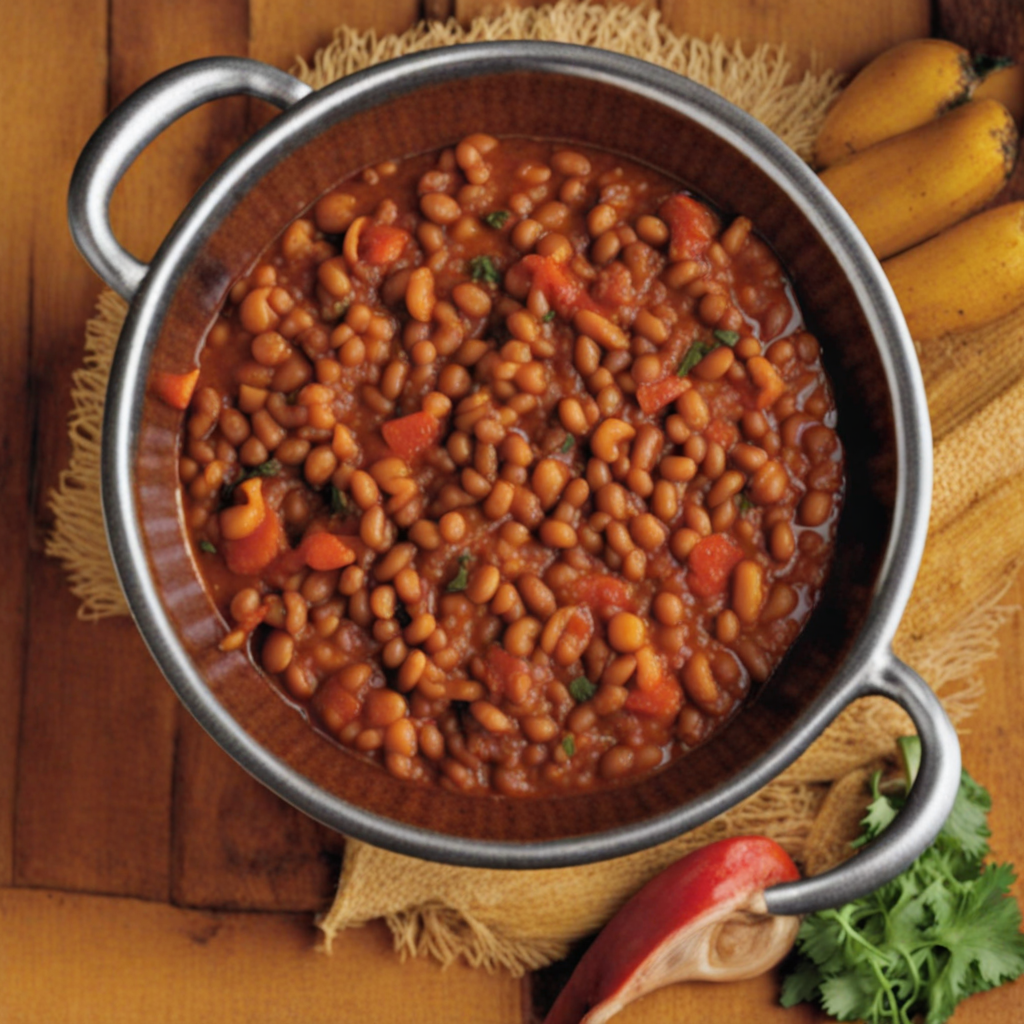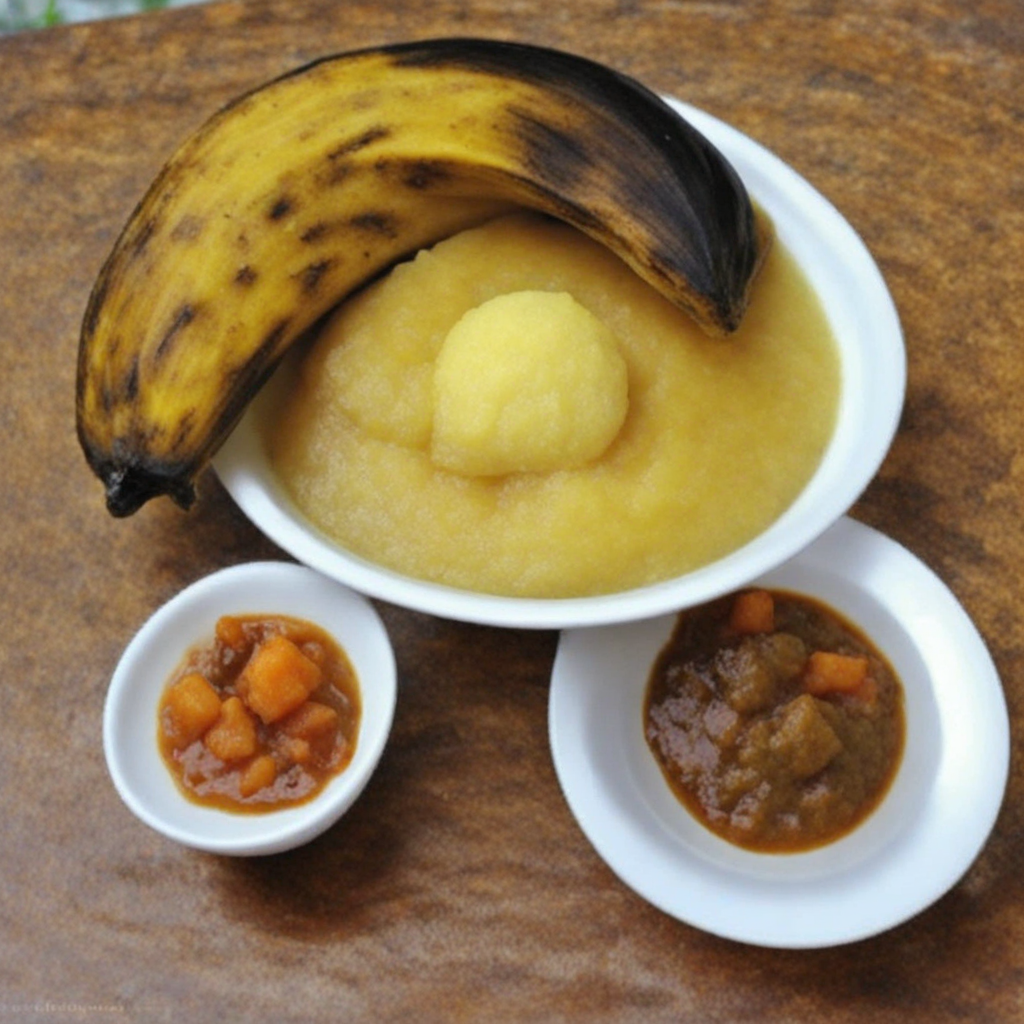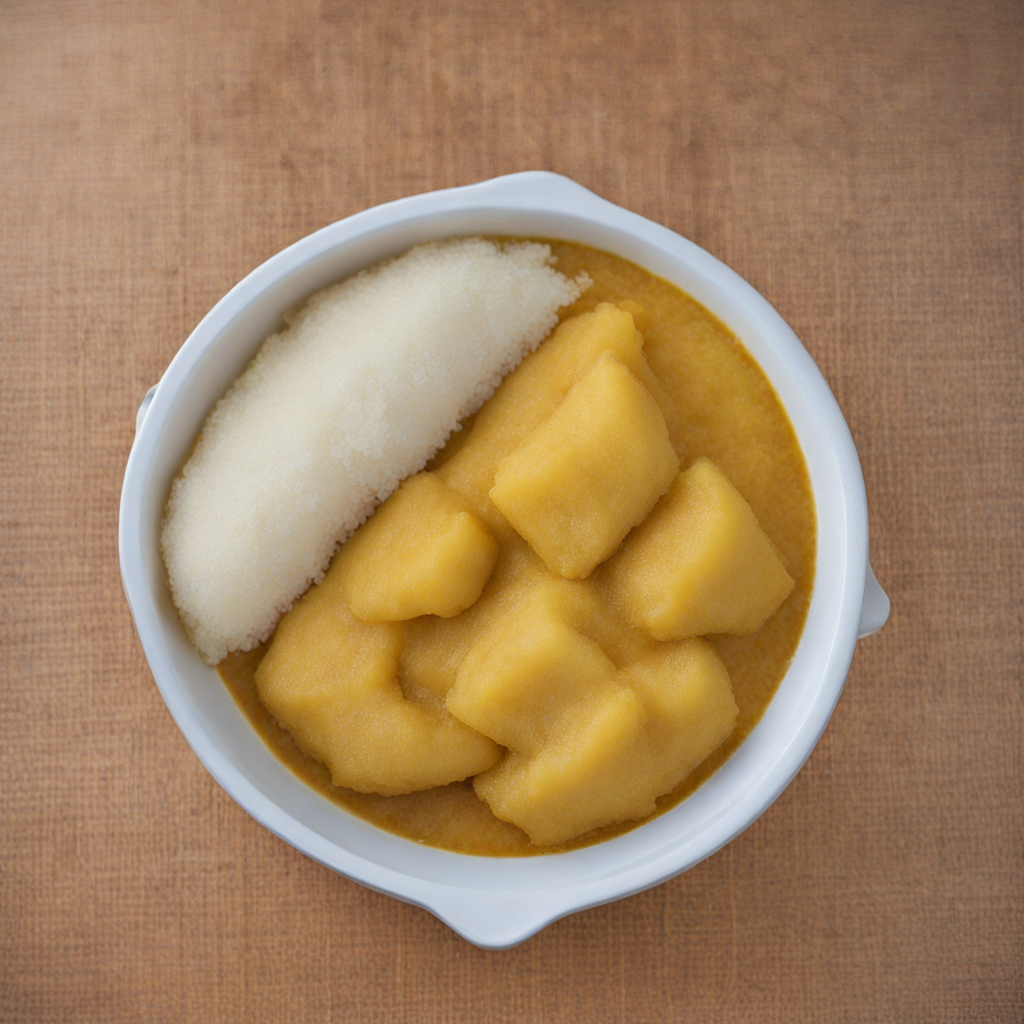Kenkey
Kenkey is a traditional Ghanaian dish made from fermented corn dough, offering a unique blend of flavors and textures that are sure to tantalize your taste buds. The preparation of Kenkey involves soaking corn in water for several days, allowing it to ferment, which imparts a slightly sour taste reminiscent of sourdough. The fermented corn is then ground into a smooth paste, wrapped in corn husks, and steamed to create a dense, hearty dumpling-like food. This fermentation process not only contributes to its distinctive tangy flavor but also makes it rich in probiotics, adding a healthful twist to this culinary delight. Once cooked, Kenkey has a firm yet fluffy consistency, often described as slightly chewy, making it a versatile accompaniment to a variety of sauces and stews. It is commonly served with spicy pepper sauce, grilled fish, or a rich tomato-based soup, allowing the flavors to meld beautifully. The dish is typically enjoyed by hand, with diners tearing off pieces of Kenkey to scoop up the accompanying sauces, creating an interactive and communal dining experience that embodies Ghanaian culture. Kenkey is not just a meal; it is a symbol of tradition and community in Ghana. It is often enjoyed during special occasions and celebrations, showcasing the importance of food in bringing people together. Whether you're discovering Kenkey for the first time or revisiting its comforting flavors, each bite offers a connection to the rich heritage of Ghanaian cuisine, inviting you to savor its unique taste and the story behind it.
How It Became This Dish
The Engaging History of Dokonu: A Culinary Treasure from Ghana #### Introduction Dokonu, a traditional Ghanaian dish, is not just a meal; it is a rich tapestry woven from the threads of history, culture, and community. Known for its distinctive texture and flavor, Dokonu holds a special place in the hearts of many Ghanaians. This dish, made primarily from fermented corn, is a delightful representation of Ghana's culinary heritage, reflecting the country's agricultural practices, social customs, and regional diversity. #### Origins: The Roots of Dokonu The origins of Dokonu can be traced back to the agrarian societies of West Africa, where maize (corn) has been a staple crop for centuries. Maize was introduced to West Africa by European traders in the 16th century, quickly becoming a vital food source. The adaptation of maize into local diets led to the creation of various dishes, and Dokonu emerged as a unique product of this agricultural transformation. The fermentation process that characterizes Dokonu is a technique that has been utilized in many cultures worldwide. In Ghana, this method not only enhances the flavor but also improves the nutritional value of the food. Fermentation allows for the growth of beneficial bacteria, making the dish easier to digest while enriching it with vitamins and minerals. This process speaks to the ingenuity of Ghanaian culinary practices, as communities adapted to their environments and sought ways to preserve and transform food. #### Cultural Significance: More Than Just a Meal Dokonu is deeply embedded in the cultural fabric of Ghana. It is often associated with various ceremonies, celebrations, and communal gatherings. Traditionally, Dokonu is prepared during festive occasions, including weddings, funerals, and festivals. Its preparation is often a communal activity that brings families and friends together, fostering a sense of unity and collaboration. In many Ghanaian communities, the act of cooking Dokonu is accompanied by ritualistic practices. For example, women often gather to prepare the dish, sharing stories and laughter as they work. This not only strengthens social bonds but also passes down culinary knowledge and traditions from one generation to the next. The sharing of Dokonu during communal meals reinforces the values of hospitality and generosity that are central to Ghanaian culture. Moreover, Dokonu is often served with a variety of accompaniments, such as spicy pepper sauce, fish, or stews, adding layers of flavor and complexity to the meal. These accompaniments vary by region, reflecting local ingredients and culinary preferences. This adaptability showcases the dish's versatility and its ability to integrate into various cultural contexts. #### Development Over Time: A Culinary Evolution As Ghana has evolved over the centuries, so too has Dokonu. The dish has undergone various changes in preparation methods and ingredients, influenced by globalization, urbanization, and the migration of people. In urban areas, for instance, the traditional methods of preparing Dokonu may have been adapted to accommodate faster lifestyles and the availability of modern cooking facilities. In recent years, there has been a resurgence of interest in traditional Ghanaian cuisine, including Dokonu. Chefs and food enthusiasts are exploring the rich heritage of Ghanaian foods, and Dokonu is often featured on menus in contemporary restaurants, highlighting its relevance in today's culinary landscape. This revival is not only about preserving tradition but also about innovating and reimagining classic dishes to appeal to modern palates. Food festivals and cultural events in Ghana have also contributed to the popularity of Dokonu. These gatherings celebrate Ghanaian culinary heritage and provide platforms for showcasing traditional dishes. This has led to a renewed appreciation for local ingredients and recipes, with Dokonu often taking center stage. #### Regional Variations: A Diverse Dish One of the remarkable aspects of Dokonu is its regional variations. Different areas of Ghana have their unique takes on the dish, influenced by local agricultural practices and cultural preferences. For example, in the Volta Region, Dokonu may be prepared with additional ingredients like groundnut (peanut) paste, adding a rich, nutty flavor. In coastal areas, it might be accompanied by fresh fish, showcasing the region's bountiful marine resources. These variations not only reflect the regional diversity of Ghana but also highlight the adaptability of the dish. As communities continue to experiment with ingredients and cooking techniques, Dokonu remains a living tradition, evolving while maintaining its core essence. #### The Modern Day: Dokonu in Contemporary Ghana In contemporary Ghana, Dokonu is experiencing a renaissance. Food bloggers, chefs, and culinary enthusiasts are rediscovering traditional dishes and sharing them through social media platforms. This digital age has allowed for the dissemination of recipes, cooking tips, and cultural stories surrounding Dokonu, drawing new generations into the fold of culinary heritage. Restaurants in urban centers are elevating Dokonu by pairing it with gourmet ingredients or presenting it with a modern twist. This has not only increased its visibility but also introduced it to a wider audience, both locally and internationally. As international interest in African cuisine grows, Dokonu stands out as a dish that encapsulates the flavors and traditions of Ghana. #### Conclusion: A Lasting Legacy Dokonu is more than just a food item; it is a symbol of Ghana's rich cultural heritage and culinary ingenuity. Its origins rooted in the agricultural practices of West Africa, its significant role in social and communal gatherings, and its evolution over time all contribute to its status as a cherished dish. As Ghana continues to navigate the complexities of modernity, Dokonu serves as a reminder of the importance of preserving culinary traditions while embracing innovation. It is a dish that connects generations, celebrates community, and showcases the vibrant tapestry of Ghanaian culture. In every bite of Dokonu, one can taste the history, experience the culture, and appreciate the legacy of a nation that has long valued the power of food to bring people together.
You may like
Discover local flavors from Ghana


